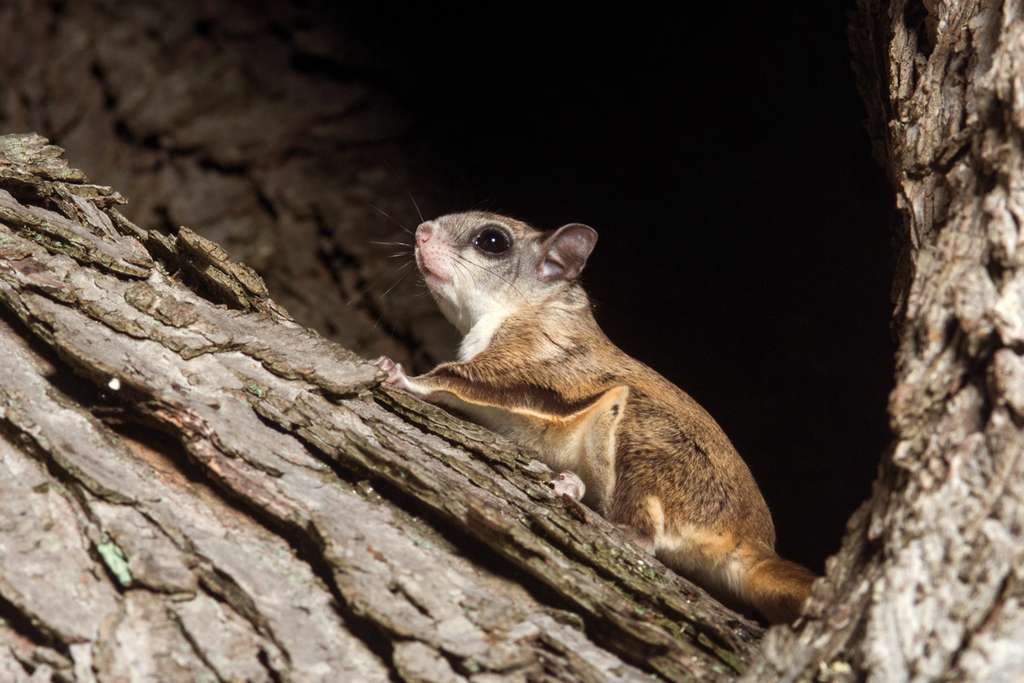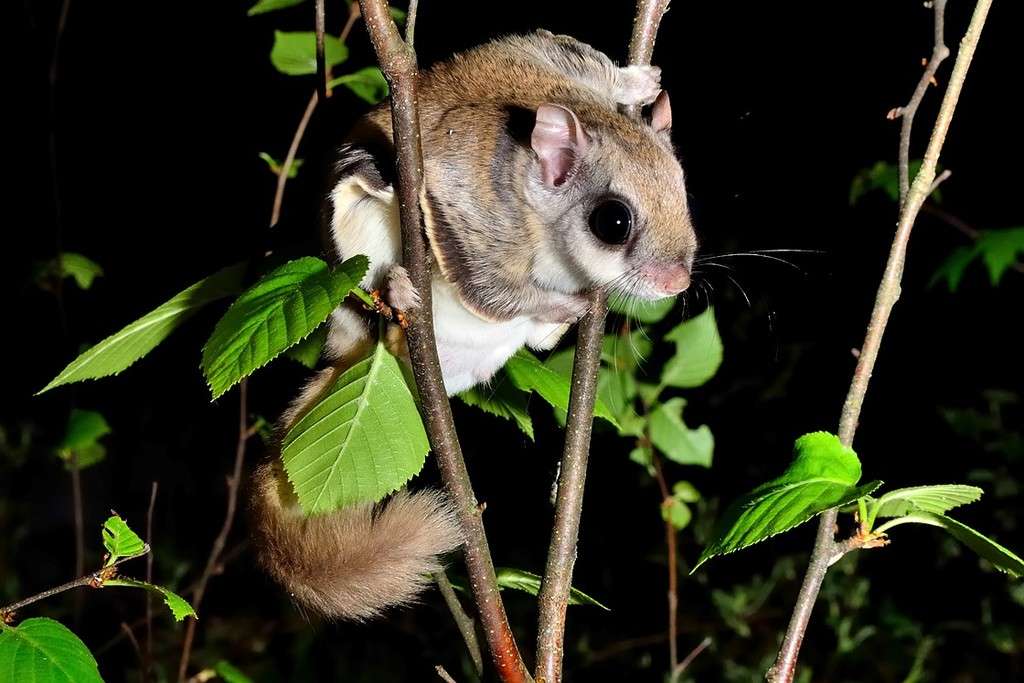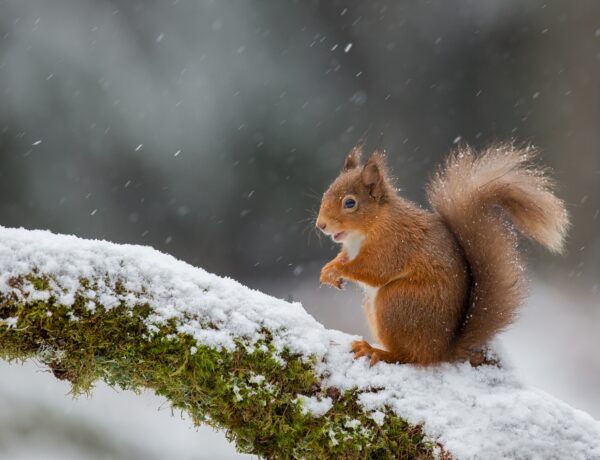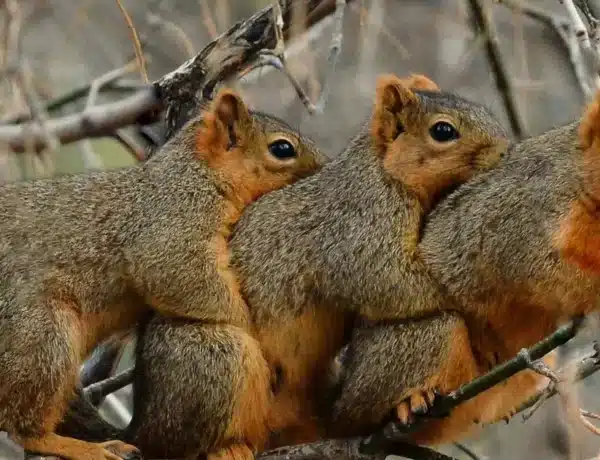Introduction
Do Squirrels Come Out At Night: Squirrels, those nimble and acrobatic creatures that captivate our attention with their boundless energy and bushy tails, are a common sight in parks, forests, and urban landscapes around the world. Whether we encounter them darting across our backyards, scaling trees with ease, or burying nuts for the winter ahead, squirrels have become an emblematic symbol of wildlife in our daily lives. Squirrels are primarily diurnal animals, which means they are most active during the daylight hours. Their diurnal behavior is a result of their reliance on the sun to find food, navigate their surroundings, and communicate with other squirrels.
During the day, they can be seen foraging for nuts, seeds, fruits, and vegetation, as well as indulging in their gravity-defying tree-climbing antics. But as the sun sets and darkness blankets the landscape, squirrels often retreat to their nests or dreys, tucked away in the shelter of tree branches, where they rest and conserve energy for the following day. Yet, the world of nature is full of surprises, and squirrels are no exception. While squirrels are primarily active during the day, there are instances where they may venture out at night. This typically occurs under specific conditions, such as during mating season or when they have young to feed and care for.
Environmental factors and human disturbances can also influence their nocturnal activity patterns. Understanding when and why squirrels bite might break from their diurnal routine to explore the world under the moon’s glow adds depth of these fascinating creatures. In squirrels and their nocturnal habits, we will delve into the factors that can prompt them to become creatures of the night. We will also uncover the intriguing ways in which squirrels adapt to the challenges of darkness, from their enhanced senses to their stealthy movements. So, if you’ve ever been curious about the secret lives of squirrels after sunset, nocturnal journey as we uncover the mysteries of whether squirrels truly come out at night.

Is it normal to see a squirrel at night?
Generally, it is very rare situation that you will hear or see squirrel during the night because squirrels aren’t active after the night falls-they tend to sleep over night. Squirrels are active during the day, especially in the morning and in the late afternoon. This is when they run around and look for food.
Mating Season: During the mating season, which varies depending on the species and location, squirrels can become more active at dusk or dawn, extending their foraging and social activities into the twilight hours in their quest to find a mate.
Predator Avoidance: If squirrels sense the presence of a potential threat during the day, they may stay hidden and choose to venture out under the cover of darkness when they perceive it as safer.
Environmental Disturbances: Urbanization and artificial lighting in some areas can disrupt natural circadian rhythms, potentially leading to altered behavior in squirrels. They might become more tolerant of nighttime activity due to the continuous presence of artificial light.
Maternal Care: Nursing squirrel mothers may need to leave their nests briefly at night to forage for food or relieve themselves. This can lead to nocturnal sightings of squirrels, particularly if you happen to be near their nesting sites.
What time of night are squirrels most active?
Overall, Red squirrels exhibit a bimodal activity pattern for most of the year, with a peak in activity three or four hours after sunrise and another two or three hours prior to dusk – during the winter there is only a single peak (in the morning) and during mid-summer there may be three (morning, late afternoon and …
Twilight Hours: Squirrels are crepuscular animals, which means they are most active during the twilight hours of dusk and dawn. During these transitional periods between day and night, squirrels are more likely to be active. At dawn, they may emerge from their nests to start their day of foraging and socializing. Similarly, at dusk, they may venture out again to secure their nighttime sustenance.
Mating Season: The mating season can be a significant driver of nocturnal squirrel activity. When it’s time to find a mate, some squirrel species may extend their activity into the night to increase their chances of encountering potential partners. This heightened activity can vary depending on the specific mating behaviors of different squirrel species.
Environmental Factors: Squirrels may adjust their activity patterns in response to environmental factors. For example, in urban areas with artificial lighting, squirrels might be more active at night as they adapt to the presence of continuous illumination. Similarly, disruptions to their natural habitats or disturbances caused by humans can influence their nocturnal behavior.
Why is a squirrel staring at me?
They are Trying to Establish if you are a Threat
For this reason, they often go into “alert mode” when they see a human approaching, and may stare at you to assess the situation. If they feel threatened, they may also start making loud noises or flicking their tails as a warning signal.
Curiosity: Squirrels are naturally curious animals. When they encounter something unusual or unfamiliar, like a human, they may stop and stare to assess the situation. Squirrels are known for their keen senses, including sharp eyesight, and they use these senses to gather information about potential threats or sources of food.
Assessment of Danger: Squirrels are prey animals, and their survival depends on their ability to detect and respond to potential predators. When a squirrel locks eyes with you, it may be trying to determine whether you pose a threat. Their assessment involves observing your movements, body language, and overall demeanor. If they perceive you as non-threatening, they may resume their activities without fear.
Food Expectations: Squirrels are opportunistic foragers. If they’ve had previous interactions with humans and associate them with a source of food, they may stare at you in anticipation of a potential meal. Squirrels have learned to recognize humans as a potential food source, especially in urban areas where people often feed wildlife.
What are the signs of seeing a squirrel?
The Meaning of a Squirrel Sighting
If you keep seeing squirrels everywhere, it could be a sign that you need to take some time for yourself. Maybe you’ve been working too hard and need to relax a bit. Alternatively, it could signify that you are due for a change in your routine.
Scurrying Movement: One of the most obvious signs of seeing a squirrel is its rapid and jerky movements. Squirrels are known for their agility and ability to dart quickly from place to place. When you spot a small, quick-moving animal racing across the ground or leaping from tree to tree, it’s likely a squirrel.
Tree-Climbing: Squirrels are adept climbers. They use their sharp claws to effortlessly ascend trees and navigate branches. Seeing a squirrel ascending a tree trunk or leaping gracefully from branch to branch is a common sign of their presence.
Vocalizations: While squirrels are not especially vocal animals, they do produce a range of sounds. These can include chattering, chirping, and even high-pitched screams when they feel threatened or are communicating with other squirrels. Hearing these sounds can be a sign that squirrels are nearby.
Are squirrels intelligent?
All rodents are intelligent animals, but the squirrel crowns the list for intelligence. While a rat/mouse can outsmart and sometimes outmaneuver a pursuing human, squirrels’ quickness and intellect give them a lead over other predators and more giant creatures.
Squirrels are renowned for their excellent memory, particularly in relation to food caching. They bury nuts and seeds in various locations, creating a stash that they rely on during leaner times. Studies have shown that squirrels can the locations of hundreds of individual caches, using spatial cues and landmarks to retrieve them.
Observations of squirrels navigating complex environments, solving problems, and overcoming obstacles highlight their problem-solving capabilities. Whether it’s figuring out how to access a bird feeder, opening a container to get to food, or navigating a maze, squirrels have demonstrated a surprising level of cognitive flexibility.
Squirrels are not solitary creatures; they engage in social interactions and live in communities. Their social behavior involves communication through vocalizations and body language, such as tail flicking and posturing. Understanding and navigating these social dynamics require a level of social intelligence.
What’s a good squirrel repellent?
Chilli flakes and pepper might put them off, so try a sprinkling of these – it’s often used to keep squirrels off bird feeders. When you come to plant up your borders, consider the scented plants squirrels dislike, such as oniony-smelling members of the allium family, strongly-scented hyacinths and lily of the valley.
Many commercial squirrel repellent sprays are available on the market. These sprays typically contain natural ingredients like hot pepper, garlic, or other substances that create an unpleasant odor or taste for squirrels. When applied to plants or surfaces, these sprays can deter squirrels from chewing on them. It’s to reapply these sprays after rain or as directed on the product label.
Squirrels are naturally wary of predators. Using predator scents, such as coyote or fox urine, around your garden or property can create the illusion of danger for squirrels. These scents are often available in liquid form or granules and can be strategically placed to deter squirrels.
Ultrasonic squirrel repellent devices emit high-frequency sounds that are unpleasant to squirrels but generally inaudible to humans. These devices can be placed in gardens, attics, or other areas where you want to deter squirrels. Keep in mind that the effectiveness of ultrasonic repellents may vary, and they may not work for every situation.
What time is best to see squirrels?
When is best? What ever the time of year, squirrels are most active not long after dawn and late afternoon. During the summer months, they will often chill out in the heat of the midday sun high in the canopy (they may even be seen having a snooze!) so with little activity, they can be hard to find.
Squirrels are typically most active in the early morning hours, shortly after sunrise. During this time, they are busy foraging for food to fuel their day. Observing squirrels in the morning provides an opportunity to witness their energetic search for nuts, seeds, and other food sources. Parks, gardens, and wooded areas are excellent places to spot them during this time.
Another prime time for squirrel-watching is in the late afternoon. Squirrels often engage in a second round of foraging during this period, preparing for the night ahead. You can see them scurrying among trees, leaping between branches, and burying food caches for later use.
The seasons can also influence squirrel activity patterns. In the fall, squirrels are particularly active as they gather and store food for the winter. This is a great time to observe their bustling activities, especially as they collect nuts like acorns and stash them away. In winter, squirrels may be less active during very cold or snowy days, so the best times to see them are usually during milder winter days when they come out to search for food.
What kills most squirrels?
Squirrels fall prey to a number of predators including birds of prey (particularly buzzards and goshawks), foxes, badgers, pine martens, domestic dogs and cats (see Predators). Many die of starvation during poor mast years or are killed on Britain’s road network.
Predation: Natural predators are one of the most significant threats to squirrels. Many animals, including birds of prey (such as hawks and owls), snakes, foxes, raccoons, and domestic cats and dogs, consider squirrels a tasty meal. Predators often rely on their agility and stealth to catch squirrels, making them vulnerable when they are foraging or moving between trees.
Habitat Loss: As urban areas expand and natural habitats shrink, squirrels face the challenge of finding suitable places to live and forage. Deforestation, land development, and urbanization result in the destruction of their nesting sites and food sources. Habitat loss is a significant threat to squirrel populations worldwide.
Human Activity: Human-related activities pose several dangers to squirrels. Vehicle collisions are a leading cause of mortality for squirrels, as they often cross roads and streets. Additionally, squirrels can become trapped in chimneys, attics, or other human structures, sometimes leading to their demise.

Conclusion
The squirrels that come out at night has taken us on a captivating journey through the lives of these charismatic rodents. Squirrels are primarily diurnal creatures, relying on the light of day to carry out their essential activities like foraging for food, communicating with their peers, and squirrels navigate their surroundings. Their daytime antics, from bounding through trees to meticulously burying nuts, have long been a source of fascination and amusement for people of all ages. The dynamic nature of nature itself, showing that even seemingly predictable behaviors can have exceptions and nuances.
Squirrels are fundamentally creatures of the day, there are situations in which they do venture into the night. These exceptional circumstances often revolve around survival and reproduction. During mating season, when the allure of a potential mate beckons, or when caring for their young, squirrels may extend their activities into the nighttime hours. Moreover, disturbances in their environment, such as urbanization and artificial lighting, can disrupt their natural rhythms and push them toward nocturnal behaviors. Understanding the factors that influence squirrels’ nocturnal habits enriches our appreciation of their adaptability and resilience.
These creatures have evolved to thrive in various environments, demonstrating remarkable flexibility in the face of changing circumstances. Their heightened senses and agility enable them to navigate the darkness, searching for food and avoiding predators, when necessary. If squirrels come out at night it is not a simple yes or no. While their core behavior aligns with daylight, the intricacies of their lives allow for nighttime activity under specific conditions. Squirrels continue to remind us of the diverse and intricate tapestry of the natural world, where every species has its unique adaptations and secrets. So, the next time you hear a rustle in the darkness or glimpse a shadowy figure on your evening stroll.





No Comments